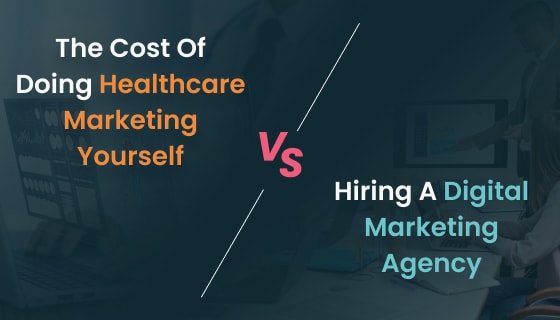Introduction
In the dynamic world of healthcare marketing, the advent of social media has steered towards a revolutionary era for patient engagement. This transformation is not just a fleeting trend; it’s a fundamental shift in how healthcare providers connect with their audience.
In this comprehensive guide on marketing for healthcare, we delve into the nuances of leveraging social media in healthcare, underscoring best practices and exploring innovative strategies for effective marketing in healthcare.

The Rising Importance Of Social Media In Healthcare
Healthcare marketing has always been a unique challenge. Balancing informative content with sensitive patient needs requires a nuanced approach. With social media integration into healthcare marketing strategies, there’s an unprecedented opportunity to reach a broader audience in a more personalized way.
Social media platforms offer various tools and features that can be utilized for interactive and informative engagement with patients in the realm of marketing for healthcare.
Each platform provides a unique way to connect with different demographics, from Facebook groups and Twitter chats to Instagram stories and LinkedIn articles, making it a valuable asset for healthcare marketing strategies.
Harnessing Social Media Potency For Patient Engagement
The primary goal of using social media in healthcare marketing is to increase patient engagement. This involves not just disseminating information but also listening to and understanding the needs and preferences of the audience. You can build trust and foster a community around your brand by engaging in two-way communication.
In the realm of marketing for healthcare, best practices for social media play a pivotal role in achieving these goals. Effective healthcare marketing on social media goes beyond one-way communication.
It entails active interaction with patients, responding to their inquiries, addressing concerns, and providing valuable insights. This engagement fosters a sense of community and loyalty around the healthcare brand.
By incorporating best practices for social media in your healthcare digital marketing strategy, you can create a dynamic online presence that not only educates and informs patients but also connects with them on a personal level.
This approach strengthens patient-provider relationships and ultimately augments patient care and satisfaction.
The Role Of Analytics In Social Media Strategy
Understanding the impact of social media campaigns is vital in marketing for healthcare. Analytics tools provided by these platforms can offer insights into the effectiveness of different types of content, best posting times, and audience demographics. This data, along with best practices for social media in healthcare, can then be used to refine strategies and improve engagement.
In the realm of healthcare marketing, analytics plays an indispensable role in assessing the success of social media initiatives. By leveraging analytics, you can gain valuable insights into how your content resonates with your target audience, enabling data-driven decisions for more effective patient engagement.
The Future Of Social Media In Healthcare Marketing
As technology evolves, so too will the ways in which social media can be utilized in healthcare marketing. The landscape is set to witness significant advancements, driven by the ever-increasing demand for personalized healthcare experiences and the need for more efficient and effective marketing strategies.
In this evolving scenario, incorporating best practices for social media in healthcare will play a predominant role in shaping the future. The following is a brief overview of the future of social media in healthcare digital marketing.
Personalized Content
The future of social media in healthcare marketing will revolve around delivering highly personalized content to patients. Tailoring information and messaging to individual needs and preferences will become the norm.
Marketing for healthcare will be driven by the understanding that one size does not fit all, and patients will expect content that addresses their specific health concerns and interests.
Advanced Targeting Strategies
To maximize the impact of their campaigns, healthcare marketers will increasingly adopt advanced targeting strategies. By leveraging data analytics and insights, they can identify precise audience segments and deliver content that resonates with each group.
This approach aligns with best practices for social media in healthcare and content marketing, where relevance and engagement are paramount.
Integration Of AI And Machine Learning
Integrating artificial intelligence (AI) and machine learning will be a game-changer in healthcare marketing. These technologies will enable predictive analytics that can anticipate patient needs and behaviors.
For example, AI-driven chatbots can immediately respond to patient queries, enhancing the patient experience. Marketing for healthcare will benefit from AI-powered content recommendations, making it easier for patients to access relevant information.

Steps Social Media Integration Into Your Marketing Strategy
Developing a cohesive social media strategy is key to success in healthcare marketing. This involves several critical steps fundamental to creating an effective online presence for healthcare organizations. Let us walk you through the essential steps of social media integration into your healthcare marketing strategy.
Identifying Target Audiences
Understanding your audience is integral in healthcare marketing, especially on social media. Different age groups, for instance, might prefer different platforms – younger demographics might be more active on Instagram or TikTok, while older patients might prefer Facebook or LinkedIn.
It’s also important to consider the specific health needs and interests of different groups, as this can significantly influence the type of content they engage with.
Setting Clear Objectives
In healthcare marketing, clear objectives are pivotal for an effective social media strategy. These goals can be diverse, such as enhancing patient engagement, promoting health literacy, or supporting mental health initiatives.
It’s important that these objectives are SMART: Specific, Measurable, Achievable, Relevant, and Time-bound. This clarity helps craft a focused social media strategy that aligns with the broader goals of your healthcare organization.
Content Planning And Creation
When planning content for social media in healthcare marketing, it’s essential to balance informative posts with engaging, relatable content. This could include patient success stories, Q&A sessions with healthcare professionals, or interactive polls about health topics.
Remember, the content should not only inform but also inspire and empower your audience. Aligning your content with healthcare awareness days or months can also give your posts added relevance and urgency, increasing engagement and reach.
Leveraging Social Media For Crisis Communication In Healthcare
In critical situations like pandemics or natural disasters, social media stands out as a rapid response tool for healthcare organizations. It’s not just about broadcasting updates; it’s about creating a two-way communication channel where concerns are acknowledged and feedback is addressed.
Platforms like Twitter and Facebook can be used for real-time updates, while Instagram and YouTube can disseminate visual content that explains complex health issues in simpler terms. This approach not only helps manage the crisis but also maintains public trust and credibility in the healthcare provider.
The following are the compelling reasons for leveraging social media for communication during the crisis.
Rapid Response To Emergencies
Social media in healthcare allows for immediate communication during crises. This swift response is crucial in a pandemic or natural disaster, where healthcare marketing teams must disseminate urgent public health information quickly and efficiently.
Combating Misinformation
A significant challenge in healthcare marketing is addressing misinformation. Using social media platforms to provide accurate, evidence-based information helps maintain public trust and helps your target audience make informed decisions about their health.
Public Health Campaigns
Effective marketing for healthcare during a crisis often involves launching targeted social media campaigns. These campaigns can spread awareness about health safety measures, vaccination drives, or other vital health-related updates.
Collaboration With Health Authorities
For social media in healthcare to be most effective, collaboration with local and national health authorities is essential. This ensures the information shared is accurate and aligns with current health guidelines.
Social Media Compliance And Ethical Considerations
Navigating the complex landscape of social media compliance in healthcare marketing requires a thorough understanding of legal and ethical frameworks. This includes not only adhering to HIPAA guidelines but also being mindful of FDA regulations regarding drug promotions and patient testimonials.
It’s vital to train staff on these guidelines to prevent unintentional breaches. Regular audits of social media content and interactions can help ensure ongoing compliance.
Ethical considerations also extend to the tone and nature of the content, emphasizing empathy and accuracy, especially when dealing with sensitive health issues. Let us walk you through essential ethical considerations.
HIPAA Compliance
Navigating HIPAA regulations is a cornerstone of ethical healthcare marketing. Ensuring all social media content complies with these privacy laws protects patient information and maintains trust.
Consent For Patient Stories
In healthcare marketing, sharing patient stories can be powerful. However, obtaining explicit consent is crucial to uphold ethical standards and build trust in your healthcare brand.
Content Review Procedures
Implementing rigorous review processes ensures that all social media content aligns with the high standards expected in healthcare marketing. This includes accuracy, compliance, and sensitivity to patient needs.
Training And Awareness
Continuous training in compliance and ethical considerations is critical for anyone involved in social media in healthcare. This ensures that all team members know the nuances of marketing in this sensitive field.
Case Studies: Success Stories In Social Media Healthcare Marketing
Detailed case studies are a roadmap for successful healthcare social media marketing strategies. For instance, a hospital that used Twitter to provide live updates during a health crisis gained widespread trust and appreciation.
Another example is a health awareness campaign on Instagram that significantly increased young adults’ engagement in preventive health measures. These stories not only inspire but also provide practical insights into what works in the digital healthcare marketing space, highlighting the importance of creativity, audience understanding, and clear messaging.
Let us elaborate on it for your better understanding.
Innovative Campaigns
Examining innovative social media campaigns in healthcare marketing can provide insights into creative approaches that have successfully engaged patients and communities.
Patient Outreach Successes
Highlighting case studies where social media has effectively reached and supported patients reinforces the power of these platforms in healthcare marketing.
Community Building Examples
Successful healthcare marketing often involves building online communities. Case studies can show how these communities offer support and valuable information to patients.
ROI From Social Media Initiatives
Analyzing the return on investment from social media campaigns in healthcare marketing can demonstrate their value and effectiveness in engaging patients.
Measuring Success: Metrics To Monitor In Healthcare Social Media Marketing
Effective measurement in healthcare social media marketing goes beyond surface-level metrics. It involves analyzing the quality of engagement, such as the sentiment of comments and the nature of shares.
Monitoring website traffic from social media platforms, tracking appointment bookings or inquiries as a result of social campaigns, and evaluating patient feedback and surveys can offer a more comprehensive view of social media’s impact. This holistic approach to analytics enables healthcare marketers to understand the true ROI of their social media efforts. Let us walk you through the key metrics in brief.
Engagement Rate Analysis
Deep analysis of engagement rates helps healthcare marketers understand what resonates with their audience, which is crucial for refining social media strategies in healthcare.
Follower Demographics
Monitoring followers’ demographics empowers healthcare marketers to tailor their content and campaigns more effectively.
Content Performance
Evaluating which posts perform best can guide future content strategies in healthcare marketing, ensuring that resources are focused on what works.
Conversion Tracking
Understanding how social media engagement translates into real-world actions is key to demonstrating the effectiveness of social media in healthcare marketing.
Social Media Advertising In Healthcare Marketing
In social media advertising for healthcare, it’s paramount to tailor messages that resonate with specific patient demographics. Advanced targeting options available on social media platforms can help reach out to individuals based on age, location, interests, and even health-related behaviors.
For instance, A/B testing tests different ad formats and messages to reveal what resonates best with the target audience. Additionally, retargeting campaigns can effectively re-engage users who have previously interacted with the healthcare provider’s content, ensuring a higher conversion rate.
The following are the vital aspects to remember for social media advertising for your healthcare practice.
Targeted Ad Campaigns
Utilizing targeted ads in healthcare marketing can significantly increase the reach and impact of health messages, especially when aiming to engage specific patient groups.
Cost-Effectiveness Analysis
Comparing the cost-effectiveness of social media advertising with other forms of healthcare marketing can highlight the efficiency and reach of these digital strategies.
Ad Compliance
Ensuring that all advertisements adhere to healthcare advertising regulations is critical for maintaining ethical standards and trust in healthcare marketing.
A/B Testing For Ads
Employing A/B testing strategies allows healthcare marketers to fine-tune their advertising for maximum impact, a crucial aspect of successful social media strategies in healthcare.
Challenges And Solutions In Healthcare Social Media Marketing
Navigating challenges in healthcare social media marketing involves a proactive and strategic approach. For instance, to tackle privacy concerns, healthcare marketers can implement strict guidelines on what can be shared and establish a secure process for obtaining and storing patient consent.
To manage negative feedback, it’s important to have a crisis communication plan in place, which includes timely responses and a protocol for escalating issues when necessary.
Regular training and updating social media policies can help staff stay aware of the latest trends and challenges, ensuring the healthcare organization’s online presence remains effective and compliant.
Let us walk you through this information in detail for better understanding.
Privacy Management
Developing robust strategies for managing patient privacy on social media is a critical challenge in healthcare marketing. This includes implementing strict data handling and privacy protocols.
Crisis Management
Effectively managing crises on social media is imperative for maintaining the reputation and trustworthiness of healthcare providers. This involves prompt, transparent, and empathetic communication.
Content Accuracy
Ensuring the accuracy of content shared on social media is a significant challenge in healthcare marketing. Establishing fact-checking protocols is essential to maintain credibility.
Policy Development
Developing and updating comprehensive social media policies is key to navigating healthcare marketing challenges. These policies should address all aspects of social media use, from content creation to user engagement and privacy concerns.
Conclusion
After reading the article, you will have learned that social media in healthcare marketing isn’t just a trend; it’s a transformative tool reshaping the landscape of patient-provider interactions. By leveraging these platforms strategically, you can build stronger relationships with their patients, offering them valuable information and support when needed.
At ZealousWeb, we are dedicated to helping healthcare organizations navigate this new era of patient engagement through innovative digital strategies and solutions. Our expertise in healthcare marketing ensures that providers can harness the full potential of social media to connect with and empower their patients.
Consider leveraging our rich expertise and extensive experience in social media services for healthcare practices and enjoy lucrative returns. Contact us today at hello@zealousweb.com for a consultation and quotation.












